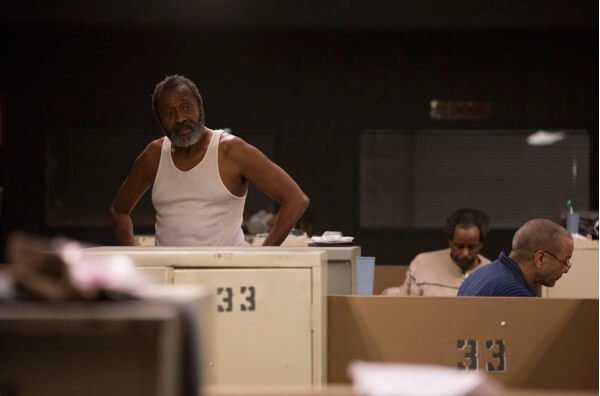Consummate showman and ultimate survivor Ben Vereen is making his movie comeback in Oren Moverman’s “Time Out of Mind,” starring Richard Gere. In it, Vereen plays a down-and-out jazz musician who helps the homeless Gere reconnect with his long-estranged daughter (Jena Malone) in a New York that –– surprise! –– can often seem cold and heartless.
Ever since “Pippin” on Broadway, Vereen –– indubitably Bob Fosse’s one major male muse, as opposed to his little army of fabulous ladies, like Gwen Verdon, Liza Minnelli, Chita Rivera, and Ann Reinking –– has thrilled audiences with his radiant triple threat talent, in his dazzling cabaret acts, films like “All That Jazz” and “Funny Lady,” and, of course, his unforgettable turn as Chicken George in that TV milestone “Roots.”
Out of town on family business, I cadged a phone interview with him, and he immediately said, “You’re in Hawaii? I love Hawaii! I performed with the wonderful Honolulu Symphony there. It was just magical. I heard they had to shut down for economic reasons but I hope they get it back together again!”
Indomitable entertainer Vereen hits the big screen again
I asked Vereen about his new film, and he said, “It’s by this wonderful director, Oren Moverman, who also did ‘The Messenger’ and ‘Ramparts.’ It’s a wonderful film about the homeless that doesn’t blame anybody, just merely says, ‘This is what’s happening.’ The way he shoots it, he puts you in the environment so you are walking and breathing with them. It’s a magical film, which says that we all must do something about this problem, for there but for the grace of God goes you. If you yourself look around Hawaii, you see a lot of homeless people.”
I had to agree with him, as it’s become an island epidemic, with some other states offering one-way tickets here to get rid of their own homeless population. The very day Vereen and I talked, there were plans afoot to remove some 3,000 homeless people from a tent city they’d set up in Kakaako, Honolulu’s current center of gentrification.
“More states should do what they did in Utah,” Vereen said. “They’re not giving them a handout, but a hand up by putting them back into houses, giving them the medical attention they need, and making them more a part of the social fiber, giving them their dignity back. The way things are today and with us living in the United States of Greed, any minute now it could be you or I. You don’t think about it, as you’re too wrapped up in your own trying to make it, but when you realize there’s nothing to make, you have to find yourself a cardboard box.”
Vereen had nothing but praise for his co-star: “Richard Gere is very generous and gracious and a very hard worker. I watched how he goes for his characterization: he engages totally and stays in character during the breaks, when they set up the cameras. I just sat there and watched this fabulous actor, whom I’ve admired for years, and was happy to have an opportunity to work with him.
Vereen, born in 1946, raised in Brooklyn, and educated at the High School for the Performing Arts in Manhattan, has had an extraordinarily long and busy career, and cited his first job in “The Prodigal Son,” by Langston Hughes and directed by Vinnette Carroll, as putting him on the map: “It was at the Greenwich Mews Theater on 13th Street, in the basement of a church. I tell young actors I teach today who all want stardom, ‘No, you want employment, so you can express your art. That’s what’s important. We’re all stars. You are a star. As you begin, you polish your star and whatever goes on in your life, you keep polishing it, and that’s why we’re talking together, because our stars are shining.’”
Vereen benefited from his early contact with three master choreographers: “I wasn’t a ballet dancer, but George Balanchine was one of the people who okayed me to go to the High School for the Performing Arts. I did a Jerome Robbins piece with the Alvin Ailey company, but I was more of a modern/ jazz dancer, more Martha Graham, and David Woods and Norman Walker were my real teachers.”
Was it difficult for him at all in the dance world back then as a straight black man?
“I didn’t think about that. I was dancing, man! [Laughs.] Who’s straight or gay –– that’s your own individual thing. People have their own makeup about who they are, and we gotta embrace all of God’s creations and love one another. It’s okay to just say that in church, but once you step outside and say things like, ‘Well, God doesn’t want you to be that…’ God doesn’t care, because he is love!”
It was “Pippin” that really made Vereen, winning him the Tony under the direction of Fosse, whom he described as “Genius. Genius. He was a taskmaster who wanted the greatness that you have inside you. He was relentless, making us do one step all day long. But that was the way he worked, a perfection-seeker. To do a Fosse –– which might look effortless –– requires discipline, and great talent [laughs]. And you gotta have style, lots of style. But you work very hard to achieve even the tiniest nuance.”
As dedicated and driven a performer as Fosse was a director, Vereen definitely shared some demons with him; “Oh, yes, they were serious! [Laughs.] But when you’ve had enough, you have to come to a place where you say, ‘I’m sick and tired of being sick and tired,’ and turn it over to your higher power. Together you can make a difference and great changes. You take that first step, which is to admit you have problems. Some people say, ‘I have a problem but I can live with it,’ but you don’t have to live like that. And there’s nothing greater than a life of sobriety. It’s been seven years for me, no, wait, eight years! [Laughs.] When you’re living it, you forget to count.”
Vereen’s life bottomed out during a period in which first his daughter Naja was killed at 16 when a truck overturned on her car on the New Jersey Turnpike in 1987, and, five years later, he was struck by a car while walking along a Malibu highway.
Asked how he managed to survive such horrors, he said, “They’re all lessons and the idea is not to wallow, but to learn from them and get up. Get up! Get up! I’m not finished with you yet! You get up and you do it step by step: if I can just get through this one moment, it will be better. I can build that up and have one minute, then maybe 20. And then, ‘Look! I have an hour!’ And if I can keep it up, I have a day and I know everything’s going to be all right.”
Vereen’s most memorable screen role remains Chicken George in “Roots”: “What can I say about it. And now I’m about to do ‘Roots II.’ It was groundbreaking, still the highest rated TV show of all time, but the point is did we learn anything from it? Why are things the way they are and the world still dealing with race? My hope with ‘Roots II’ is to remember the people of James Island, now renamed Kunta Kinte Island, who did not benefit from that show and are still impoverished. They make most of their money from tourism, and most tourists are Europeans who go there to see that African door of no return in Gambia, where people became slaves throughout the world.
“We need to remember these people, and our own legacy in this ties in with all this dissension going on, with all of these killings and brutality and gun violence, going into churches and killing people and shooting young black men in the streets. What were the ‘60s and my generation of protesters all about? I think what happened is we took a tranquilizer or sleeping pill, people, and we gotta wake up!”
I was eager to ask Vereen about the many legends he has worked with in the business.
“Sammy Davis, Jr., the wonder man, my mentor, my guiding light. This guy was in a way a show-er for a lot of African Americans, as well as my Caucasian brothers and sisters, showing us his determination, his love and love of his craft, his art.
“Barbra Streisand came to see me in ‘Pippin’ and hired me to do ‘Funny Lady.’ She was wonderful to work with and a perfectionist. But then all true artists are. Right now I’m directing ‘Hair’ in Venice, Florida, which will open November 10, and I expect perfection from everyone myself, because I’ve learned from masters like her and want to pass it on to young artists of today. I’ve reimagined ‘Hair’ and taken it to another place, using it to talk about where we are today and what have we have done.
About Liza Minnelli, Vereen said, “I love Liza. As a matter of fact, I was thinking I gotta call her because we’re doing an act together next year and taking it on the road. I love that lady!”
Vereen radiates such ebullient joy onstage that I was amazed to discover that he indeed gets nervous: “I always get nervous. I want them to like me and have an experience. Someone told me a long time ago, that if you are not nervous then you have no business going out on that stage. What’s going on instead is your ego, and that is E.G.O: Edging Goodness (or God) Out! So I take a step back, say a prayer from my group. I breathe and go forward and do it, and hope people receive what I have to give.”
Contact David Noh at Inthenoh@aol.com, follow him on Twitter @in_the_noh, and check out his blog at nohway.wordpress.com.


















